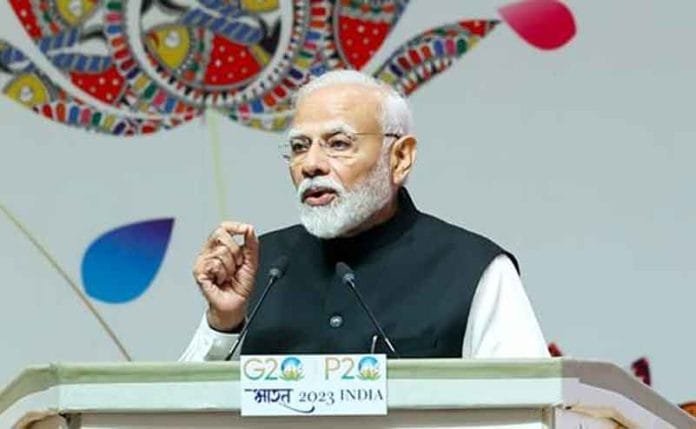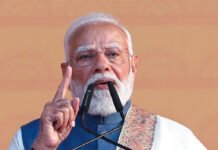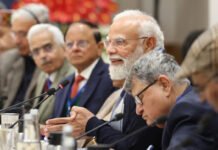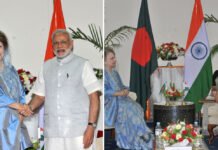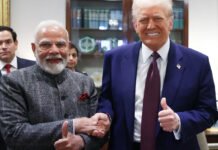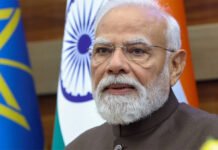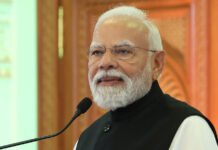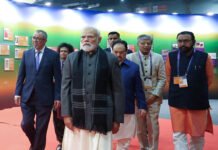INVC NEWS New Delhi – On Tuesday, Prime Minister Narendra Modi delivered a powerful and forward-looking address at the YUGM Conclave, held at Bharat Mandapam, New Delhi. The event brought together a dynamic convergence of government leaders, academia, scientists, and researchers, all of whom are playing a pivotal role in India’s transformation journey. PM Modi’s speech centered on the urgent need to innovate, accelerate, and collaborate in order to achieve the ambitious vision of a Developed India by 2047.
A Race Against Time: Limited Time, Lofty Goals
While addressing the gathering, Prime Minister Modi emphasized the limited time frame and the enormity of India’s development goals. He stated with clarity and resolve that although time is constrained, the mission is grand. Importantly, he clarified that his message was not merely about present circumstances but rather about the long-term strategic vision of the nation.
“We have set a 25-year timeline for a Developed India. The journey from idea to prototype must be completed in the shortest possible time. When we bridge the gap between laboratory and marketplace, the outcomes of research begin reaching people faster and with greater impact,” said PM Modi.
This urgency reflects the government’s target-oriented governance model, where measurable outcomes and timely delivery of innovation are key priorities.
YUGM: The Unified Front for Nation-Building
PM Modi described the YUGM platform as a historic confluence of stakeholders. The term ‘YUGM’ symbolizes unity in diversity — “a unified group of government, academia, science, and research.” This event, therefore, was more than a conclave; it was the blueprint for an interdisciplinary collaboration to realize national goals.
“Those who dedicate their lives to serving others are the ones who truly live,” Modi remarked, quoting ancient Indian scriptures to inspire a sense of selfless service and national responsibility.
He called for synergistic action between sectors, urging scientists, researchers, and policymakers to work shoulder to shoulder. According to PM Modi, this united effort is crucial to fast-track India’s journey toward being self-reliant and globally competitive.
The Youth as the Architects of India’s Future
A major part of PM Modi’s address focused on empowering the youth, whom he called the “foundation of any nation’s future.” He stressed that preparing young minds is non-negotiable in achieving India’s long-term vision. To this end, a radically overhauled education system is being rolled out.
“We have implemented a new National Education Policy (NEP). From Class 1 to Class 10, new books have been prepared. These are aligned with the demands of modern learning and critical thinking,” he said.
This policy initiative aims to nurture curiosity, innovation, and technical skills among students from an early age. By aligning the curriculum with real-world applications, India is cultivating a future-ready workforce capable of propelling the country into a global leadership position.
Revolutionizing Indian Research and Innovation
Highlighting India’s recent technological milestones, PM Modi referred to the 422-meter-long Hyperloop test track developed by IIT Madras. This groundbreaking project is not just a symbol of scientific prowess but a representation of India’s futuristic vision.
“This Hyperloop track is a glimpse into the future. It shows how Indian institutions are now leading in deep tech and advanced mobility solutions,” PM Modi noted.
He applauded the rapid strides made in indigenous research, with Indian scientists setting global benchmarks in AI, renewable energy, defense technology, and space exploration. The Prime Minister also stressed the importance of translational research, where innovation directly addresses societal needs and is promptly brought to market.
Accelerating the Journey from Lab to Market
PM Modi placed significant emphasis on reducing the time lag between research and commercialization. Bridging this gap ensures that innovations are not just theoretical but have a real-world, people-centric impact.
“The shorter the distance from lab to market, the faster the benefits of research reach the people. This also becomes a source of inspiration for future discoveries,” he stated.
This vision underlines the government’s policy focus on incubation hubs, technology parks, and startup accelerators. These initiatives are aimed at scaling innovative solutions and integrating them into mainstream economic sectors.
Government as a Catalyst for Innovation
PM Modi underscored the government’s evolving role from being a regulator to an enabler. Today’s administration is focused on facilitating ease of doing science, just as it promotes ease of doing business.
The Prime Minister assured the research and academic communities of policy stability, financial support, and global partnerships to promote indigenous innovation. India’s emphasis on Make in India and Digital India is directly tied to these strategic imperatives.
“We are ensuring that our youth and our institutions do not have to look abroad for opportunities. We are creating the ecosystem right here,” he said.
The 2047 Vision: A Developed India Rooted in Self-Reliance
PM Modi’s YUGM address concluded with a powerful reiteration of his government’s vision for 2047 — when India will celebrate 100 years of independence. This vision includes:
World-class infrastructure
Sustainable urban and rural development
Universal access to quality education and healthcare
Leadership in cutting-edge research and manufacturing
Technological sovereignty and green innovation
The Prime Minister urged every stakeholder — from policy planners to students — to consider themselves contributors to nation-building, not mere beneficiaries of government schemes.

